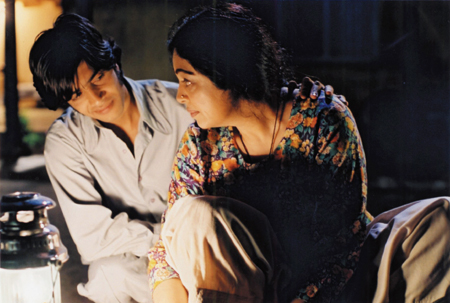|
Reviews of Recent Independent, Foreign, & Documentary Films in Theaters and DVD/Home Video
SILENT WATERS
Silent Waters begins with lighthearted scenes of family life and romance. Two
middle-aged women, widowed Ayesha (Kirron Kher) and a friend, are on a roof in Charkhi,
Pakistan, laughing and talking about an upcoming wedding while Ayesha's spoiled son, Saleem
(Aamir Malik), refuses to get out of bed despite his motherís wake-up calls. Once up,
he clandestinely meets his girlfriend, Zubeida (Shilpa Shukla), an intelligent and career-oriented
teenager. Later, the community celebrates a wedding, complete with music and dances
reminiscent of Bollywood.
However, change is in the air. It is 1979, and the fundamentalist Islamic revolution in Pakistan
under General Zia-ul-Haq slowly creeps into the village. Young men like Saleem find purpose in
Islamic fanaticism. Teenage school girls, including Zubeida, stare in confusion as Saleem and his
cohorts lay bricks on top of the schoolís small wall until not one girl can look out beyond it. Saleemís
religious campaign affects Ayesha most of all, bringing to the surface the terrible burden of her
past as well as severing her relationship with Saleem and her community.
The story is narrated in a flowing, understated way, consisting of slice-of-life scenes. The
increasing fear and oppressive atmosphere is sensed rather than showed - in a father's refusal to
let his daughter sing because it would not be prudent.
This is precisely what makes the film so compelling, making the oppression and the deep
suffering of Ayesha, her son's rejected girlfriend Zubeida, and the violence in all its forms stand
out.
The film is not without faults. Saleem's conversion is too sudden and not very convincing,
though well acted, and the music can be a bit melodramatic at times.
But the film captures the sense of despair of Ayesha, who was oppressed in the
past, thought it was behind her, and then finds herself trapped in violent fanaticism all over again. Silent Water dares to talk about the 1947
partition of Pakistan and India and the horrendous crimes committed against women that followed. It resonates
both for its portrayal of a historical moment and the similar challenges women in
Pakistan and other Muslim countries still face today. Roxana M. Ramirez, Peruvian laywer and journalist, formerly a member of the Peruvian Human Rights and Public Service Ombudsman
|
